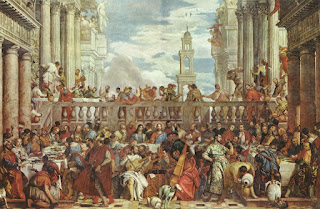 Jesus and six of his disciples attended a wedding at Cana (John 2:1-11 ). When the feast ran out of wine his mother suggested he fix the problem. Jesus balked saying, "My hour has not yet come." Mary wasn't deterred, she instructed the servants: “Do whatever he tells you.” The wedding gained at least 120 gallons of wine—more than 50 cases worth. Some thoughts:
Jesus and six of his disciples attended a wedding at Cana (John 2:1-11 ). When the feast ran out of wine his mother suggested he fix the problem. Jesus balked saying, "My hour has not yet come." Mary wasn't deterred, she instructed the servants: “Do whatever he tells you.” The wedding gained at least 120 gallons of wine—more than 50 cases worth. Some thoughts:Mary
Mary didn’t ask Jesus for anything, she just stated the facts: “They have no wine.” Perhaps she just expected him to go out and buy some—after all he and his six extra guests helped create the shortfall. More likely Mary knew her son's capabilities and after 30 years thought he should get started.
The water
Jesus asked the servants to fill six jars with water—this seems odd. Filling the jars took a lot of water; this was a major task for servants already tired from servicing a wine guzzling party. Instead of giving the servants extra work why didn’t Jesus fill the jars with wine and be done with it?
This preparatory task accomplished at least two things: the servants became knowledgeable witnesses, and they became part of the miracle. The servants knew more than the master of the wedding and they knew Jesus had not played some parlor trick—they hauled the water. There are exceptions, but most of Jesus’ miracles involved cooperation: donating a few fishes and loaves, reaching out to be healed, a touch, or even removing the grave clothes from Lazarus. Even when raising the dead Jesus involved others.
The wine
You wouldn’t expect Jesus to create bad wine, but did he create the best wine that ever existed? No, that would be showing off and would shift the focus away from the newlyweds. The master of the wedding said the wine was good—he didn’t say it was great.
Did Jesus “borrow” this wine from someone's inventory, or did he transform the water into wine? Transformation seems more likely. Why bother filling the jars with water if you are just going to transport in wine from somewhere else?
And Mary was right—Jesus’ hour had come.

